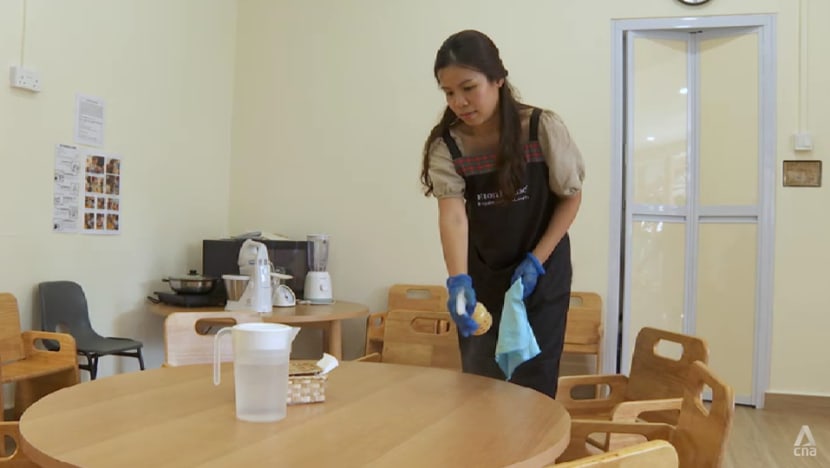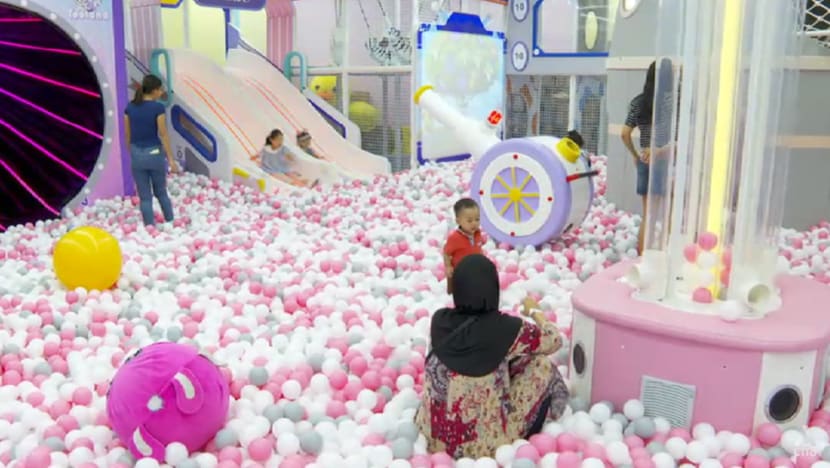Preschools, indoor playgrounds step up cleaning and disinfecting efforts as HFMD cases rise
Hot and rainy weather could be behind the recent rise, said observers.

Apart from daily sanitising and conducting regular health checks on its 9,000 pupils, preschool chain EtonHouse has taught its staff to know what to do when there is a hand, foot, mouth disease case.

This audio is generated by an AI tool.
SINGAPORE: Some preschools and indoor playgrounds are stepping up their cleaning measures as the number of cases of hand, foot and mouth disease (HFMD) spike in Singapore.
The cases hit a high this year in the week of May 19 to 25, with an average of 50 a day, statistics from the Health Ministry showed. This is up from 29 cases in the same period last year.
Hot and rainy weather could be behind the recent upsurge, said observers.
NO LETTING UP ON THE CLEAN UP
HFMD is a generally mild and self-limiting childhood disease. The virus can affect all ages but children are more susceptible, especially those below five years old.
It spreads when someone comes into contact with the saliva, nasal discharge, rash fluid, or even faeces of an infected person. It can also spread through surfaces or objects that have such particles.
At indoor playground Yooland, staff are disinfecting and wiping down more frequently now. Temperature checks also made a comeback two weeks ago.
With more than 200 visitors daily during peak periods like weekends and the school holidays, the indoor playground - located at Westgate mall in Jurong - is not leaving anything to chance.
The floors are vacuumed and mopped several times a day. Surfaces and toys are also disinfected, while certain areas are closed off each week for deeper cleaning.
“We also conduct regular staff training to tell them about HFMD, what the symptoms are going to be like, so they can identify the kids who may be infected with HFMD very easily,” said Mr Bryan Bai, general manager of Yooland.
“We also monitor the whole playground very closely. The management does regular checkups … to see the cleanliness of the whole playground.”
He added that they also review feedback from parents and take the necessary actions.
So far, it has been notified of just one HFMD case this year.

WARM, RAINY WEATHER
Meanwhile, preschool chain EtonHouse is closely monitoring the situation.
Besides daily sanitising and conducting regular health checks on its 9,000 pupils, it has taught its staff to know what to do when there is a HFMD case.
“When hand, foot and mouth disease is reported to the school, the first thing we do is that within 24 hours, we inform all parents of the school about the case in the class,” said Mr Ng Yi-Xian, group CEO of EtonHouse International Education Group.
“The class is then segregated from the rest of the school, and then a cleaning protocol kicks in where almost daily all the toys in the school are washed and cleaned.
The affected class eats their meals separately, and the school is also fumigated.
Affected children only return to school when they have a doctor’s letter stating that they are clear of the virus, after which the class will “reintegrate” with the rest of the school, said Mr Ng.
The warmer temperatures and rainy weather could have contributed to the rise in cases, he noted.
“The hand, foot and mouth disease actually is known to increase when there are changes in the temperature as well as in the humidity.”
Dr Muhaimin stressed that practising good hygiene, including the regular washing of hands, is important.
Symptoms, which may vary among individuals, can include fever, sore throat, rash, headache, loss of appetite, and ulcers in the throat, mouth, and tongue. Some individuals may show no symptoms at all.
They are typically mild and should go away in about a week.
However, parents should still keep an eye on their children in case complications develop, said Dr Muhaimin.
“If they are not treated fast enough, then it can progress to a more serious condition,” he added.


















